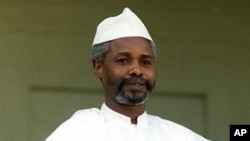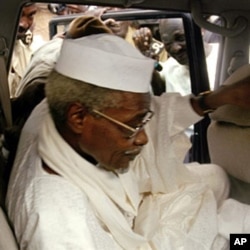West Africa's regional court says it will decide in October whether Senegal can try former Chadian president Hissène Habré for crimes against humanity.
In 2008, former Chadian leader, Hissène Habré, filed a complaint with the court of the Economic Community of West African States (ECOWAS) to block his trial for crimes against humanity in Senegal, citing violations of his rights.
The court heard arguments in the case Friday in Abuja and said it would rule on October 19.
Habré asked the ECOWAS court on Friday to order Senegal to pay him $11 million in damages, according to the French news agency AFP.
Habré's lawyer, Francois Serre, says if the court decides that Habré's rights have in fact been violated, Habré would be entitled to compensation as he has been the victim of judicial harassment. He says Habré's reputation has been damaged and he has not been allowed to move freely as a private citizen and live peacefully in Senegal as a political refugee.
The former Chadian leader fled to Senegal after being deposed in 1990. He has since been accused of crimes against humanity and thousands of political killings and cases of torture during his eight years in power.
Habré has been under house arrest in Senegal since 2000.
In 2006, the African Union called on Senegal to try Hissène Habré in the name of Africa. Since then, Senegal has adopted laws that would allow it to do so, but the case is at a standstill as Senegal awaits international funding for the trial.
Habré's defense lawyers say Senegal's decision to amend its laws specifically targets Habré and that these new laws cannot be applied retroactively for offenses committed before they were introduced.
But lawyers for the Senegalese government in Abuja Friday said Habré's complaint before the ECOWAS court was unfounded.
A lawyer for Senegal, Boubacar Cisse, says they expect the court to reject Habré's demands. Senegal, he says, has ratified international conventions and incorporated them into its internal legislation. He says Habré sees this new legislation is an attack on his rights, but Senegal holds that this legislation is impersonal and does not target Habré.
Sadel Ndiaye, also a lawyer for Senegal, called Habre's complaint before the court premature.
He says, at this time, Senegal has put in place legal measures that would allow it to try Hissene Habre, but it has not done it yet. Nidaye says since we have not tried him yet, he can not claim his rights have been violated, and the laws Senegal has adopted, he says, will apply to everyone.
But lawyers for Hissène Habré disagree and say that preparations for the trial are already under way in Senegal.

